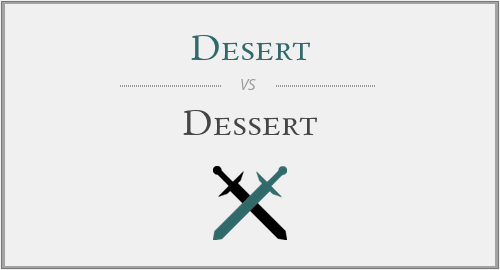I would love to enjoy a cold dessert in a desert.
Dessert and desert is the most common pair of words that is confused with each other very often. Both the words rhyme with each other and are very similar in spellings (just a difference of an s), which is the main reason they are confused. In this article, we guide you about the meaning, examples, difference and tips to remember both of these words.
Desert as verb:
Desert is used as a verb in English language where it means to abandon (a person, cause, or organization) in a way considered disloyal or treacherous. He deserted his wife and daughter and went back to England. It also represents people leaving a place causing it to appear empty. The tourists have deserted the beaches. When a quality or ability fails someone when he/she most needs it, it deserts them. Her luck deserted her. Desert is also employed in military terms where it means to illegally leave the armed forces.
His life in the regiment had been such a hell that he decided to desert.
Desert as noun:
Desert is also used as a noun in English language where it means a waterless, desolate area of land with little or no vegetation, typically one covered with sand. The desert of the Sinai Peninsula is a harsh place. Another quite rare meaning of desert as a noun is a flock of lapwings.
A desert of lapwings rises from a ploughed field.
Desert as adjective:
Desert is unique in a way that it is also employed as an adjective in English language. When some situation or place is like a desert (noun) or feels like a desert, it is described as desert. Overgrazing has created desert conditions. An uninhabited and desolate place is also called a desert.
The desert wastes serve as hideouts for criminals at night.
Dessert as noun:
Dessert with (double s) is a noun in English and has one single meaning that is, the sweet course eaten at the end of a meal. It originated in mid-16th century from French, past participle of desservir ‘clear the table’, from des- (expressing removal) + servir ‘to serve’.
A dessert of chocolate mousse complemented a light meal.

Examples:
A forecast of heavy rain through Tuesday in the Desert Southwest and Southern California could trigger another round of life-threatening flash floods, the National Weather Service said Monday. (USA Today)
Panaridus plans to contract for its guayule with farmers in the southwest, many of whom are looking for a new desert crop after a steep decline in the local cotton industry. (The Salt Lake Tribune)
Iraqi deserters fleeing front lines for life in Europe (The Globe and Mail)
Seemingly, the JD(U)-RJD-Congress grand alliance has kept its doors open for deserters from other parties or combination, including the NDA. (The Times of India)
‘The joke is on them!’ Jenna and Farrah get their just deserts as it’s revealed their nominees are actually SAVED from eviction (The Daily Mail)
Buddy Valastro, cable TV’s “Cake Boss,” has always dreamed of designing a heavenly dessert for the Holy Father. (The New York Post)
Domino’s Pizza has introduced a new, warm dessert that’s a combination of chocolate chunk cookies and fudge brownies. (The Detroit Free Press)
Desert or dessert:
A dry, desolate place is a desert (one s) whereas a sweet treat is dessert (double s). Remember that once you have a dessert, you always crave for more and so dessert with two s-es. You can also remember the spellings of dessert as the ss in dessert stand for sweet stuff.








Have a discussion about this article with the community:
Report Comment
We're doing our best to make sure our content is useful, accurate and safe.
If by any chance you spot an inappropriate comment while navigating through our website please use this form to let us know, and we'll take care of it shortly.
Attachment
You need to be logged in to favorite.
Log In